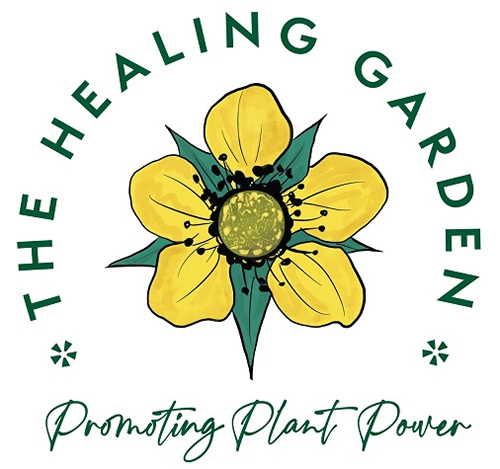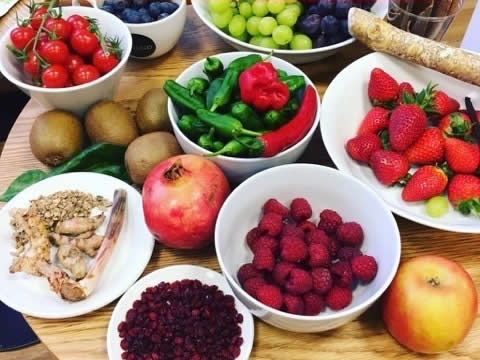Positive Health Online
Your Country

The Healing Garden: Berry Season
listed in herbal medicine, originally published in issue 274 - November 2021
When you start looking, you will realize that berries are everywhere and that the berry season lasts all year!
The word ‘berry’ is at least a thousand years old, though its origin is uncertain. One suggestion is that it comes from the word ‘berg’, which in German means mountain, perhaps referring to berries’ original, natural environment.
Many of the berries we eat today were present in nature when much of the Earth’s land was in its natural state and, although their abundance has been diminished drastically over recent years by forest clearing, intensive farming and urbanisation, berry plants continue to grow where no other foods will flourish: from the furthest latitudes to the highest altitudes, and from the driest climates to the poorest soils. Forest, moors, bogs, and wastelands, unusable for conventional food growing, provide the perfect habitats for many health-giving berries, and hedgerows and gardens are ideal places for growing and picking nature’s own medicines, available to all without prescription or payment.
But what is a berry? Botanists use the terms “fruit” and “berry” differently from the rest of us. In botanical terms, a berry is a fleshy fruit produced by a plant from a single ovary. Many fruits, such as strawberries, are commonly thought of as berries although they do not fit this strict technical definition. On the other hand, bananas, cucumbers, melons, and apples are, botanically speaking, berries. So, for practical purposes, it is usual to define berries as small, juicy, edible fruits that are round or oval in shape, sweet to sour in taste, generally brightly coloured and containing seeds or small stones.
Some botanical berries are normally thought of as vegetables – tomatoes, for example, are the most popular berries around the world with an annual global production of fresh tomatoes amounting to around 180 million tonnes – for comparison, that is half the amount of potatoes grown globally each year! Other berries normally thought of as fruits include kiwis, and persimmons. Some small fruits, such as cherries, damsons, sloe and rose hips, are not berries the in formal botanical sense, although they grow in typical berry habitats, contain similar phytonutrients, and are commonly used as food and medicine in the same ways as true berries.
In a world full of food and health challenges, berries are prepacked gifts from the natural world. They are one of the most common foods on the planet, eaten by almost every species as well as by people of every religious and dietary persuasion. Many indigenous peoples have a long tradition of including berries in all kinds of dishes, from main courses to desserts, as well as the more usual jams, syrups, and jellies – and the joy of finding a perfect, peaceful symbiosis with nature is immense and empowering.
The most amazing thing is that berries are prepared by plants for the specific purpose of enticing us to eat them: From the plant’s perspective, the purpose of producing edible berries is procreation. Most berries have a mutually advantageous relationship with birds and animals in which the plant invests some resources in packaging its precious seeds in a tasty brightly coloured and nutritious pie for wildlife to enjoy. In return, the birds and animals drop the seeds far from the parent plant, usually with a starter kit of natural fertiliser, ready to germinate and establish the species in a new place, hastening the turning of a virtuous natural circle.
Berries are packed with carbohydrates and protein to give the seed carriers the energy and strength to travel far, as well as phytochemicals to keep them healthy en-route. Depending on the length of the carrier’s digestive system, the seeds are excreted hours – or sometimes days – later. In some cases, it seems that plants adapt to become more accessible to particular species, and similarly some birds and animals adapt their anatomy and physiology to become expert berry eaters.
This, at any rate, is how things are supposed to work, but like any win-win situation, the system is vulnerable to cheating; some birds and animals eat berry pulp without spreading the seed, while so-called seed predators, such as parrots, destroy the seed too. Other species are known to eat berries and then dispose of the seeds somewhere inappropriate or inhospitable to berry plants.
Since flushing toilets were invented, humans tend not to fulfil their part of the bargain - unthinkingly sending the seeds into rivers and seas where they are unable to grow. Composting toilets, on the other hand, could help deliver seeds wrapped in fertilizer to new environments, and also preserve water resources. In places like the Pyrenean mountains where I used to live, composting loos are becoming increasingly popular, but here in Sussex it is not yet the done thing.
So, to do my bit, I have planted an edible hedge in the Healing Garden to support berry proliferation and provide food for passing wildlife. With urban gardens now sprouting in many parts of the world, I hope that more people will be inspired to grow berries, and that a positive side effect of the Covid pandemic will be to encourage us all to spend more time under open skies, picking this natural source of food and medicine while enjoying the sights, scents, and sensations of a simple freedom.
Making the link between our food and the environment it comes from is also very empowering and can become a useful tool in times of need or emergency. Not long ago (and still the case in some parts of the world), knowing where and how to stock up on highly nutritious, immune-boosting berries in preparation for winter was a vital strategy for survival. And knowing just some of the nutritional and medicinal uses for berries can be useful for promoting and preserving health and wellbeing.
The fact that most berries are easy to story and use out of season is an added attraction. Many are easy to dry, and those that are too watery to be dried effectively can be frozen or preserved with alcohol, vinegar, or sugar. The monks of medieval Europe frequently used alcohol to make medicinal tinctures, and many of the liqueurs, wines, syrups, and jams that we enjoy today started life as berry-based remedies taken to improve health and overcome disease. Blackcurrants were used as a cough remedy long before they were made into jams and vitamin C drinks, and elderberry wine was once (and still is!) a popular, and effective, treatment for feverish colds.
The American navy once used cranberries to prevent scurvy on long sea voyages in the same way that the British navy used limes, and many slightly acidic berries have an equally high content of vitamin C, a powerful antioxidant that is important for the maintenance of connective tissues as well as for the healthy function of the immune system. The anthocyanin plant pigments that give some berries their strong blue and red colours are also beneficial to health, acting as antioxidants that can help protect body cells from cancer.
Another berry pigment, lutein, is a carotenoid responsible for a variety of yellow, orange, red and green plant colours. Eating a diet rich in lutein (found in tomatoes and in all yellow, red, and orange berries) can help prevent cardiovascular disease and slow the progression of eye disorders such as macular degeneration.
Berries are also popular for the natural sugars they contain and, as many can be eaten raw, they provide a natural, cheap, and healthy alternative to confectionery. Encouraging children to substitute some store-bought confectionery with fresh or dried berries can have a significant beneficial impact on their health and well-being.
Increased berry consumption as part of a normal diet can enhance liver function and reduce levels of of tissue inflammation, probably because of the high levels of potent antioxidants present in most edible berries. Eating just 150g of mixed berries daily has been shown to lower blood cholesterol, reduce the risk of heart disease, stabilise blood sugar and improve insulin resistance.
It is good to remember that the health benefits of berries were eaten and understood long before we had any scientific evidence, and that berries have always provided a substantial contribution to the health of living beings on this planet. They are easy to grow, require little attention and are easy to store. They are also delicious to eat and to drink, they make perfect snacks, tasty packed lunches, and are convenient foods for journeys; and growing or going out to pick your own berries is also a healthy, life-enhancing pastime. So there is much to be gained from adopting a berry lifestyle...
Further Information
Kirsten Hartvig ND NMIMH DipPhyt Medical Herbalist is Director of the Healing Garden, and curator of the Biodynamic Botanic Garden at Emerson College in Sussex. You may contact Kirsten for private consultations, to join one of the monthly herb walks, sign up for our workshops, or if you would like to visit the gardens at The Healing Garden, Emerson College, Forest Row, East Sussex RH18 5JX; Tel: 07477 220707; info@thehealinggarden.uk https://www.thehealinggarden.uk/ If you want to support the Healing Garden, please follow us on Patreon: www.patreon.com/healinggardenuk. Kirsten may be contacted on Tel: 07477 220707; info@thehealinggarden.uk https://www.thehealinggarden.uk/ http://www.emerson.org.uk/biodynamic-botanic-garden
Comments:
-
No Article Comments available

